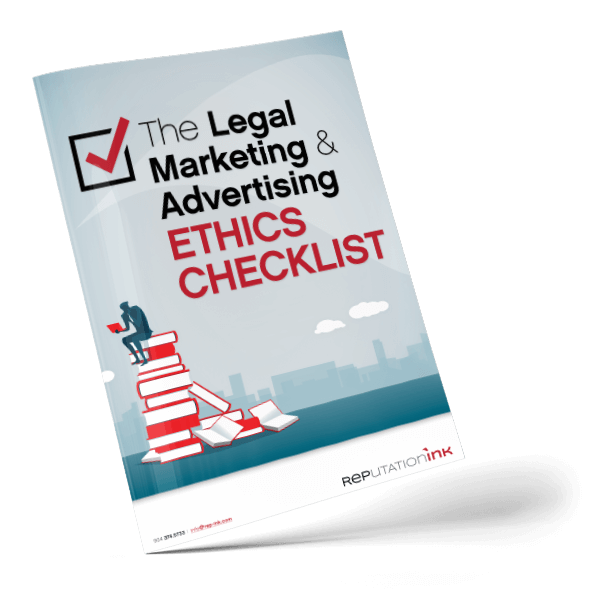
Inksights Blog : The Reputation Ink Blog
How Law Firm Marketers Can Use Client Testimonials Ethically
Referrals and relationships are the lifeblood of law firm marketing and business development. Thus, it makes sense that law firms request and promote client testimonials, endorsements and reviews. Instead of saying how great you are, let a client say it for you. What’s more powerful than that?
“Instead of saying how great you are, let a client say it for you. What’s more powerful than that?”
Unfortunately, it’s not that simple in the legal world, which is governed by rules of professional conduct that vary from state to state.
A majority of states have adopted the American Bar Association’s (ABA) Model Rules of Professional Conduct in various forms, including Rule 7.1 on Communications Concerning a Lawyer’s Services.
In general, client testimonials are permitted as long as they are truthful and not misleading. To be safe, you should always check your state’s rules, and for good measure, include a disclaimer that the firm cannot guarantee results for future clients based on past successes. (Note that some states require particular disclaimers, so it’s important to check what applies to your firm.)
Is it worth it to ask for testimonials?
From a marketing strategy standpoint, I strongly recommend that you put in place a process for securing client testimonials. After an engagement, law firms should always ask clients to provide a testimonial that speaks to the attorneys’ “soft” skills (e.g., how attentive and responsive the attorneys working on the matter were) as well as the effectiveness of their representation.
Florida’s rules on client testimonials
While I can’t review every state’s rules concerning client testimonials, let’s look at Florida’s guidelines as an example. Florida is well known as one of the strictest states in the regulation of lawyer advertising.
Florida prohibits client testimonials that:
- The giver of the testimonial is not qualified to make
- Are not the actual experience of the giver
- Are not representative of what the law firm’s clients actually experience
- The law firm has written or drafted
- The person giving the testimonial is paid to provide
- Do not include a disclaimer that prospective clients may not obtain the same or similar results (if results are given in the testimonial)
In Florida, “lay” (non-lawyer) clients are considered unqualified to make statements about a lawyer’s skills as a lawyer. For example: “Attorney Smith is a great lawyer or is the most knowledgeable family lawyer in Orlando,” or “Attorney Jones is an expert in family law.” However, non-lawyer clients are considered qualified to make statements such as: “I was very happy with my results, the lawyer explained things clearly to me, was personable, made me feel at home, was available to me, answered my calls and questions, etc.”
Also in Florida:
- The testimonial must comply with the other advertising rules. For example, the testimonial could not say that a lawyer is the “best DUI lawyer in the business.”
- The lawyer cannot edit the testimonial.
- Clients must consent to giving the testimonial, including the specific information that is provided about the client.
- Testimonials may include past results, as long as they are objectively verifiable, omit no material information and contain the appropriate disclaimers.
A few other notable restrictions
Most state bars allow law firms to mention the name of their client giving the testimonial, as long as the client consents. However, in New York, if you wish to include the client’s name, you must get written consent.
Some states prohibit client testimonials about specific successes or the quality of the lawyer’s work but allow testimonials about the lawyer’s soft skills, such as responsiveness, timeliness and the like. And, some states require disclaimers for “hard” testimonials (about the quality and effectiveness of the work, the lawyer’s skills, etc.), while not requiring them for these “soft” testimonials.
Surprisingly, some states allow law firms to provide some sort of incentive (monetary or otherwise, such as credits against a client’s account or discounts on services) in exchange for a testimonial. However, the firm must identify those as paid testimonials.
LinkedIn recommendations
What about LinkedIn? On the popular online business platform, users can write reviews about other LinkedIn members. Because the recipient has control over whether the recommendation is published on their profile (or hidden), most states consider this attorney advertising and subject to the rules.
So what should an attorney do if they receive a recommendation? Review it and make sure it complies with their state’s attorney advertising rules (here’s a helpful checklist) before hitting “publish.” Attorneys should also post disclaimers that their LinkedIn profile is considered attorney advertising and that recommendations do not guarantee future results.
Related Law Firm Content
Strengthening the Profile of a Florida-Based Full-Service Law Firm
Reputation Ink | Oct. 3, 2025
Elevating a National Litigation Firm’s Profile Through Strategic PR and Thought Leadership
Reputation Ink | Jun. 17, 2025
Crafting attorney bios that instill trust, build relationships and boost reputation
Reputation Ink | Apr. 22, 2025














